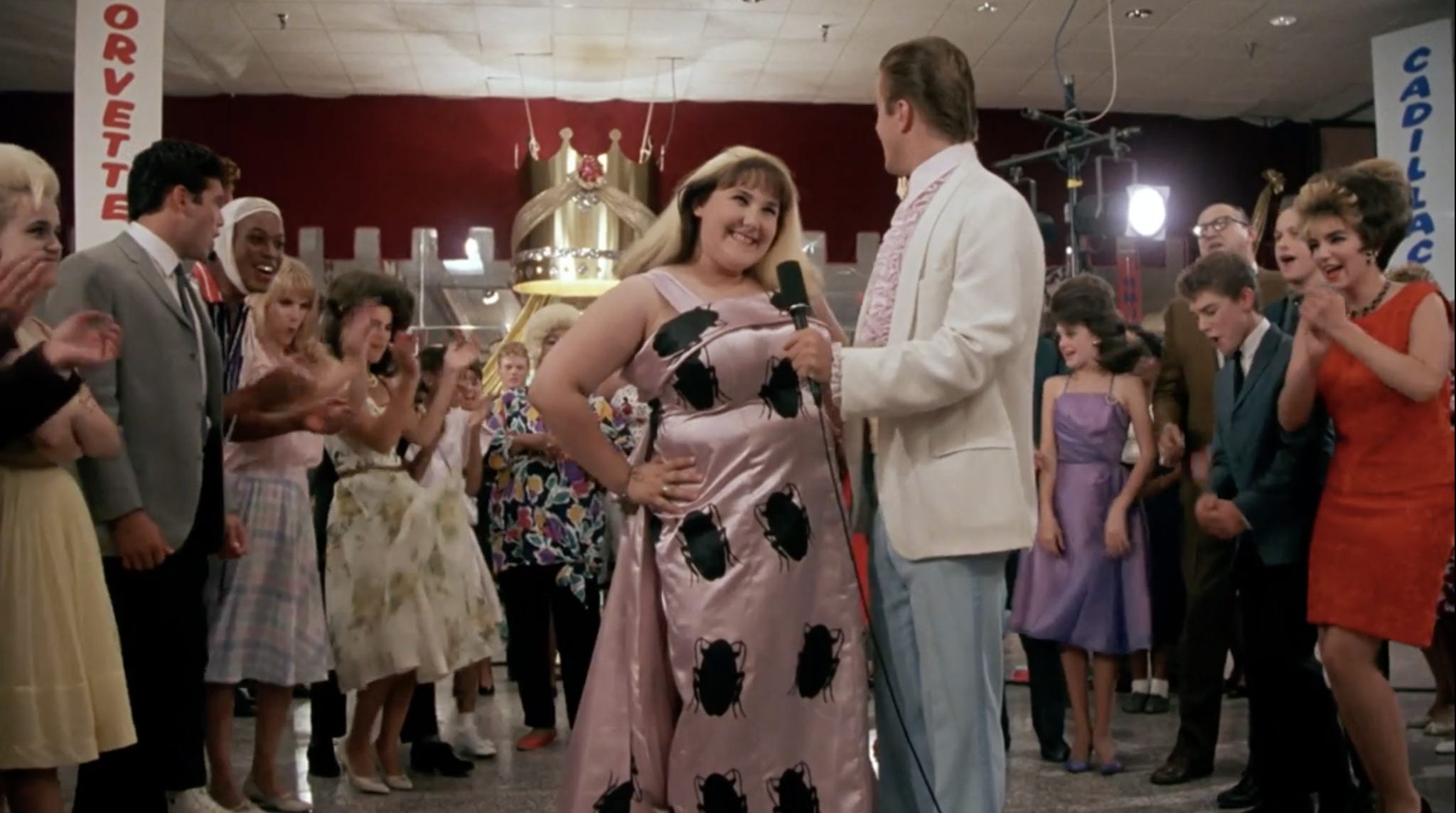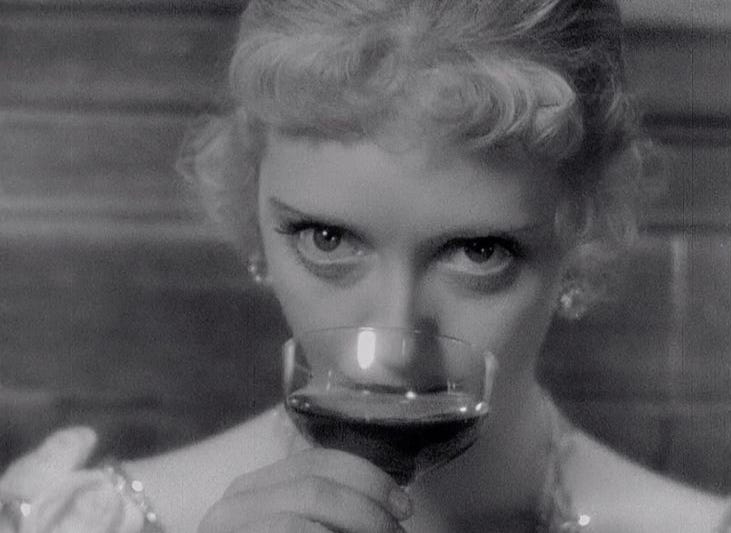From the Vault: July '22 Streaming
Bette Davis, Blaxploitation, the American Gangster Film, Costume Design Part II, ElvisCore Encore

July 15, 2022
Sometime around 1933, Bette Davis needed an abortion. She was on the precipice of accepting her biggest role yet, for Of Human Bondage: a film about a waitress who — after becoming pregnant by a man who abandons her — brings a child she is unable to care for into the world. The child dies, and, eventually, because this is a melodrama, so does she... destitute, sick, and on the fringes of society. It was a meaty, deeply unsympathetic role, so it was a perfect fit for Davis, who saw it as an opportunity to finally show her true talent as an actress, not an ingenue. She spent six months aggressively hounding Jack Warner to loan her out to RKO for the part... finally, he relented. But Bette Davis, just 26 and the sole breadwinner for her entire family (including her then-husband), was pregnant.
Bette Davis, like Joan Crawford, Jean Harlow, Lana Turner, and so many others, had the abortion and carried on with her career without disruption ("Abortions were our birth control," claimed an anonymous actress cited by Vanity Fair, reflecting on the era in which the film studio "fixers" would coordinate, even insist upon, such services for its young female stars). When asked about her abortion by author Charlotte Chandler, Davis noted that her most iconic characters: “Jezebel, Judith, Elizabeth [the I], Charlotte, and Margo Channing” likely could not have happened if she had the baby: “But I didn’t miss any of these roles, and I didn’t miss having a family." (She'd go on to have three children, one of whom would write a barn-burning tell-all). Bette Davis was 65 on January 22, 1973, when the Supreme Court handed down the decision backing the constitutional right to privacy in the case of Roe v. Wade — ten years prior to that landmark ruling, she made history as the first performer (of any gender) to receive 10 Academy Award nominations for acting, a metric that has only been surpassed by a very small group of people. On June 23, 2022, 33 years after Bette Davis passed from this world, the Supreme Court struck down Roe vs. Wade, ending nearly fifty years of protection of abortion rights for American women.
Welcome to July streaming. Bette Davis is the featured performer of our actor's showcase for the month of July, which I like to set aside for my most personal streaming themes... I apologize it's coming in so late. This month, we're tackling two of my favorite (incendiary) film genres and revisiting some old favorites. I hope you enjoy it.
She's a Bitch/She's a Lover/She's a Child/She's a Mother: The Singular Bette Davis, Queen of Classic Film

In a review of the film Dangerous (1935), which won Bette Davis her first Academy Award for Best Actress, E. Arnot Robertson of Picture Post wrote: "I think Bette Davis would probably have been burned as a witch if she had lived two or three hundred years ago. She gives the curious feeling of being charged with power which can find no ordinary outlet." Jack Warner, archvillain, and the head of Warner Bros. studios, had a different summation of her peculiar onscreen quality: "sometimes bland and not beautiful." Davis battled with this cantankerous studio head all her life, even launching a lawsuit against Warner Bros. to get out of her contract, which gave her no freedom to choose her own roles (she was sick of being "the girlfriend" to famous men in forgettable drivel). She didn't win her lawsuit, but — in her words — she won the war, as it both scared WB into giving her better parts and served as a precursor for Olivia de Havilland's (successful) 1944 lawsuit against Warner Bros. that would help break up the exploitative studio system, in which Hollywood Studios owned every aspect of their actors' lives and images. Bette Davis was the first woman to receive the American Film Institute's Lifetime Achievement Award, and she fought for a number of liberal causes during her time: she co-founded the Hollywood Canteen, a free nightclub for Allied servicemen that was integrated (unheard of for military clubs at the time, and entirely due to Davis' demands). Yet as much as she achieved over the course of her extraordinary life, and as much as she challenged notions about what a woman could do and be on screen, my love for her is a bit more personal. Growing up, I always fixated on my sunken bug eyes: perhaps the defining feature of my face, the thing I use to communicate with the world, inherited from my grandmother Marie. Not ugly, just... funny looking. Sometimes Bland. Not Beautiful. But at some undefinable moment, I watched our sleeveless VHS copy of All About Eve (1951) and learned of the existence of Bette Davis, a woman whose sunken bug eyes were so distinctive that there was even a song about it. She was perfect, to me: beautiful and sophisticated and clever and devastating and maudlin and mean and arch and vulnerable and every raw edge that makes up the whole sum of a person... the model of a perfect woman, made all the better by the attributes that made her so imperfect. By her own admission, she wasn't always the most attractive woman in the room, but she was the most interesting... brittle and funny and worldly and fabulous. She wore her anger and neuroses on her sleeve; she was a fighter; she'd get as ugly and coarse and unlikable as she needed to for a role, star system be damned. And of course, and most significantly, she was Camp. You couldn't — and can't — take your eyes off her. She pins you in place, across time, a spirit just made for cinema. She'll expose you, when she snows you...
Play Straight, stay Loose Baby: Blaxploitation Films

"This film is dedicated to all the brothers and sisters who have had enough of the Man," declares the opening titles to Melvin Van Peebles' incendiary 1970 film, Sweet Sweetback's Baadasssss Song, which is widely regarded as the first so-called "blaxploitation" film. "Blaxploitation" was a(n) (initially condescending) term for low-budget films that purportedly furthered stereotypes of black people, which would peak in the first half of the 1970s and quickly become mainstream. I love blaxploitation cinema for all its contradictions and complications as a groundbreaking force for black artistry, its incorporation of radical ideology, and its cultural legacy. As we stare down the barrel of a white Christofascist state, there's no better time to delve into the surprising delights and explosive elements of blaxploitation cinema. Sweet Sweetback's Baadasssss Song was a radical treatise of black empowerment: leftist and unabashedly anti-establishment, the film was used as a recruiting tool for the Black Panthers, who found in it an appealing mix of black liberation and generational cool. The blaxploitation films that followed would not all share the radical vision of Van Peebles' film, which is why some chafe against its designation as the progenitor of blaxploitation film. It would be Gordon Parks' 1971 film, Shaft, which would greenlight the novelty of backing black filmmakers to make films that encapsulated the black urban experience for a "niche,'' profitable black filmgoing audience. As mentioned a while back with the 90s black filmmaking renaissance, Hollywood has long served as a hostile space for black creatives (dating back to the silent era), and it largely delegated black performers into two categories of representation (with few exceptions): Minstrel-show stereotypes, and variations of the so-called "Magical Negro" archetype, tinged by respectability politics (for which the suave Sidney Poitier was the non-controversial poster boy). These films were not for black Americans, nor did they reflect their culture: in both instances, the characters were filtered through what white Americans wanted them to be (intellectually inferior or "one of the good ones"). "Blaxploitation" cinema allowed many black filmmakers and performers to translate black slang, music, dress, and cultural norms — not to mention the ethos of the "Black is Beautiful" movement — to the screen for black audiences (at least initially), setting a historical precedent for a generation of black filmmakers and endlessly influencing popular culture, including hip hop and rap. There is a lot of controversy surrounding what blaxploitation cinema represented: on the one hand, many of these films — which were embraced by mainstream Hollywood studios — reinforce racist, sexist, and/or homophobic messaging, particularly given the genre's propensity for arch characters and stereotypes. On the other hand, the movement actually gave space for black characters to be more than just idiots or saints: Superfly is one of the earliest black anti-heroes; Coffy and Cleopatra Jones presented strong, beautiful black women with flaws and vices; Blacula and Ganja & Hess begat a tradition of modern black horror. And the music. Bringing soul, funk, and R&B to the big screen, artists like Curtis Mayfield, Marvin Gaye, James Brown, Willie Hutch, Bobby Womack, and Issac Hayes gave us terrific soundtracks, further imbuing films of the era with a coolness that was just plain missing from Hollywood cinema to that point (just watch Little Stevie Wonder in 1964's Beach Blanket Bingo and Little Richard in 1967's Catalina Caper to see how mainstream Hollywood previously incorporated black rock musicians into the fold). You have Shaft. Superfly. Coffy. Black Caesar. Across 110th Street. Trouble Man. The Mack. These scores are declarative statements: since the "first" use of "rock and roll" to score a film (Blackboard Jungle, 1955), film approached rock music cautiously... despite the use of jazz in cinematic scores, rhythm & blues — performed by black musicians — largely stayed relegated to concert films (like The T.A.M.I. Show, from 1964). But blaxploitation scores introduced explosive musical forms to narrative films, changing the very fabric of popular film. The true blaxploitation era was brief, but its impact reverberated for generations, spawning loving homages and parodies like Jackie Brown (1998), Shaft (2000), Black Dynamite (2009)... even Megan Thee Stallion's unreleased Hype Williams music film, Fever (the hotties have not forgotten)... which take inspiration from the outrageousness and charm of the microgenre. Here is a basic blaxploitation primer, laid out by year. Can you dig it?
If anything in this life is certain, if history has taught us anything, it is that you can kill anyone: The American Gangster Film from The Black Hand (1906) to The Irishman (2019)
Keep reading with a 7-day free trial
Subscribe to The Spread to keep reading this post and get 7 days of free access to the full post archives.




